 A health personnel prepares a dose of the Pfizer-BioNTech vaccine against the COVID-19 coronavirus at a children's hospital in Colombo on Sept 24, 2021, as the country began inoculating children over 12. (ISHARA S KODIKARA / AFP)
A health personnel prepares a dose of the Pfizer-BioNTech vaccine against the COVID-19 coronavirus at a children's hospital in Colombo on Sept 24, 2021, as the country began inoculating children over 12. (ISHARA S KODIKARA / AFP)
MAPUTO / ZAGREB / VILNIUS / NAIROBI / COPENHAGEN / BERLIN / HARARE / WASHINGTON / RIGA / ZURICH / PRAGUE / WARSAW / TORONTO / BRASILIA / PLOIESTI, Romania / MOSCOW / LONDON / PARIS / KYIV / STOCKHOLM / GENEVA - Pfizer Inc and BioNTech SE said a booster shot of their COVID-19 vaccine restored full protection in a large study, results that are likely to bolster the argument for giving a third dose more widely.
A booster was 95.6 percent effective against symptomatic COVID-19 in the study, which followed 10,000 people aged 16 and older, the companies said in a statement Thursday. The fast-spreading Delta variant was the predominant strain during the trial.
A booster was 95.6 percent effective against symptomatic COVID-19 in the study, which followed 10,000 people aged 16 and older, Pfizer and BioNTech said in a statement Thursday
“We believe boosters have a critical role to play in addressing the ongoing public health threat of this pandemic,” Pfizer Chief Executive Officer Albert Bourla said in a statement. The companies said they’ll share the data with health authorities in the US, Europe and elsewhere.
Regulators have wrestled with how widely to use boosters as the Delta variant drives infection rates up. Some countries, such as Israel, are using boosters extensively. Many others -- including the US and much of Europe -- have thus far come down on the side of a third dose for the elderly and other high-risk individuals.
Half the trial participants got a booster, with five cases in that group over an average follow-up period of two and a half months. There were 109 cases in the group randomly assigned a placebo shot. The booster was just as safe as the original two-dose vaccine.
The trial results show that “booster vaccinations could play an important role in sustaining pandemic containment and a return to normalcy,” BioNTech CEO Ugur Sahin said.
Trial participants received a booster an average of 11 months after their second dose of the vaccine. They were an average of 53 years old, with slightly under one-quarter of the group older than age 65. Efficacy of the third shot was consistent across age groups and among people with pre-existing conditions, the companies said.
EU
The EU drug regulator is unlikely to decide whether to approve Russia's Sputnik V coronavirus vaccine until at least the first quarter of 2022 because some data needed for the review is still missing, a source with knowledge of the matter said.
"An EMA decision by the end of the year is now absolutely impossible," the source said, referring to the European Medicines Agency.
If the required data is received by the end of November, "then the regulators may well decide in the first quarter of next year", he said. He declined to be identified due to the sensitivity of the matter.
The EMA, which launched its formal review of the Russian vaccine in March, had previously been expected to decide in May or June whether to approve use of the vaccine in the bloc.
The results of Phase III trials published in The Lancet in February have shown it is almost 92 percent effective. Russia said later Sputnik V is around 83 percent effective against the Delta variant.
The vaccine is widely used in Russia and approved for use in more than 70 countries. The source said there was no reason to doubt its effectiveness or safety.
Gamaleya Institute, which is supervised by Russia's health ministry, developed the vaccine and oversaw the clinical trials, while Russia's sovereign wealth fund, the Russian Direct Investment Fund (RDIF), markets Sputnik V overseas.
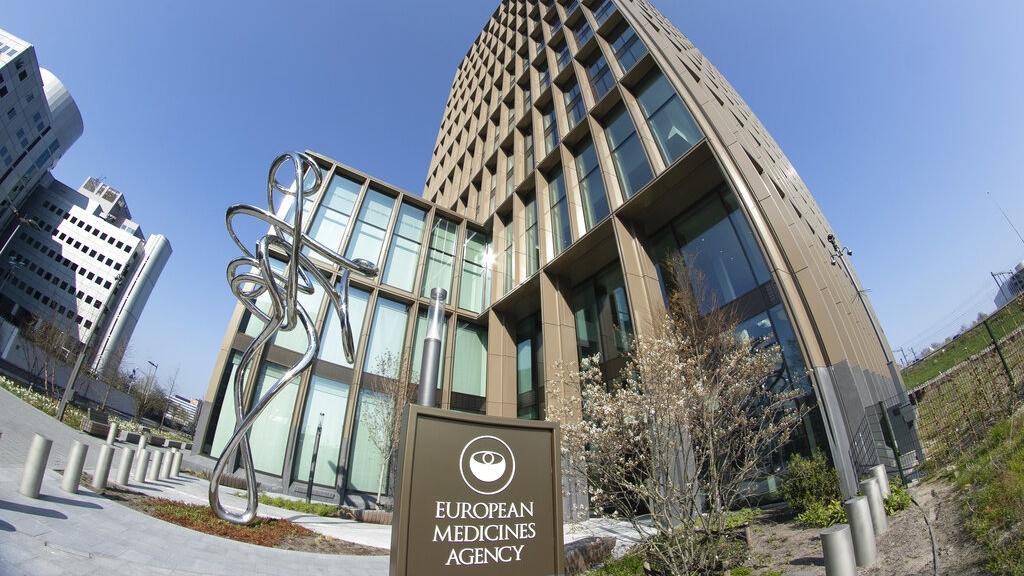 This file photo dated April 20, 2021 shows an exterior view of the European Medicines Agency (EMA) in Amsterdam, the Netherlands. (PETER DEJONG / FILE / AP)
This file photo dated April 20, 2021 shows an exterior view of the European Medicines Agency (EMA) in Amsterdam, the Netherlands. (PETER DEJONG / FILE / AP)
The EMA said in an email the vaccine remains under rolling review until sufficient evidence is available for a formal marketing authorisation application.
"EMA will be in a better position to comment on possible timelines for an authorisation of Sputnik V once a marketing authorisation application has been submitted to the agency," it said.
"EMA asked for a more complete dossier on production, details of how the vaccine is produced. When they have this dossier they will also be able to understand where to ask for inspections," the source said.
These details concerned both the production of the active ingredient and the bottling of the finished product, the source said.
The slow pace of approval is the latest blow for Moscow, which hopes the backing of an international regulator will allow it to compete with vaccines made by US drugmakers Pfizer and Moderna which have become dominant on the global market.
On Thursday, the Kremlin said there were technological differences between Moscow and the European Medicines Agency (EMA) regarding the completeness of paperwork submitted for the certification of Russia's Sputnik V vaccine.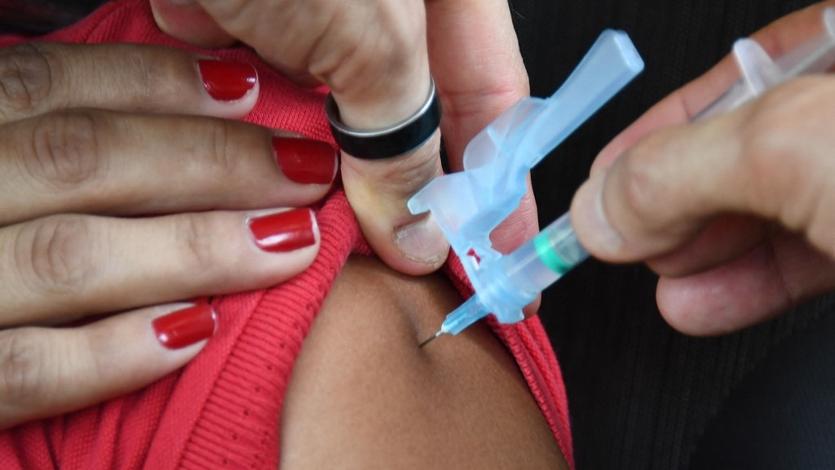 A health worker administers a dose of the CoronaVac COVID-19 vaccine to a man at a drive-thru vaccination post in Brasilia on Sept 13, 2021. (EVARISTO SA / AFP)
A health worker administers a dose of the CoronaVac COVID-19 vaccine to a man at a drive-thru vaccination post in Brasilia on Sept 13, 2021. (EVARISTO SA / AFP)
Brazil
Brazil has had 15,609 new cases of the novel coronavirus reported in the past 24 hours, and 373 deaths from COVID-19, the health ministry said on Wednesday, reporting the lowest death toll for a Wednesday since April last year.
The South American country has now registered 21,680,488 cases since the pandemic began, while the official death toll has risen to 604,228, according to ministry data, in the world's third worst outbreak outside the United States and India and its second-deadliest.
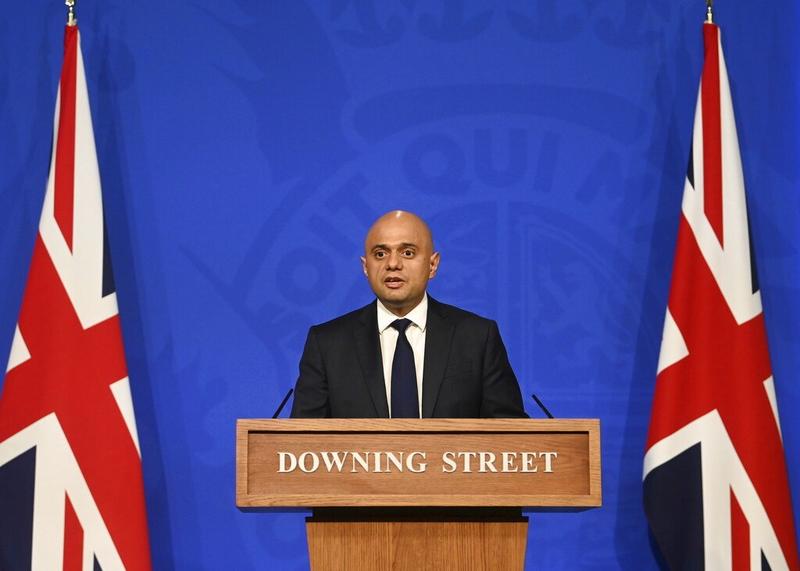 Britain's Health Minister Sajid Javid speaks during a media briefing in Downing Street, London on Oct 20, 2021. (TOBY MELVILLE / POOL PHOTO VIA AP)
Britain's Health Minister Sajid Javid speaks during a media briefing in Downing Street, London on Oct 20, 2021. (TOBY MELVILLE / POOL PHOTO VIA AP)
Britain
Britain's COVID-19 infection numbers could rise to 100,000 a day, but the government will not implement its so-called "plan B" contingency measures at this time, Health Minister Sajid Javid said on Wednesday.
"We're looking closely at the data, and we won't be implementing our plan B of contingency measures at this point, but will be staying vigilant, preparing for all eventualities," he told a news conference.
Javid on Wednesday also resisted calls from doctors for a return of restrictions to halt a rising wave of COVID-19 infections, but gave a stark warning they would be brought back if people did not take up vaccination offers.
Britain reported 223 new deaths from COVID-19 on Tuesday, the highest daily figure since March, and cases are the highest in Europe, with nearly 50,000 new infections reported on Wednesday.
The government's plan is to rely on vaccines and drugs to limit the impact of the virus this winter, instead of bringing in restrictions or any more lockdowns, having already shut the economy three times.
But Javid gave a warning that the 5 million people aged over 16 who have not had a vaccine dose needed to get one, and those already vaccinated needed to take up booster shots when offered.
Otherwise a "Plan B", involving limited steps such as mask mandates, a work from home order and vaccination passes to get into venues, would be enacted.
"Am I saying that if we don't do our bit, get vaccinated, all those behavioural changes that we can make, that we are more likely to face restrictions as we head into winter, then I am saying that," he told a news conference.
"If not enough people get their booster jabs, if not enough of those people that were eligible for the original offer ... don't come forward, if people don't wear masks when they really should ..., it's going to hit us all, and it would of course make it more likely we're going to have more restrictions."
Meanwhile, Britain said on Wednesday it had secured deals for two COVID-19 antivirals, one developed by Merck and the other by Pfizer, which it said could be used to treat patients by the end of the year if regulatory approval is granted.
 Liberal leader Justin Trudeau makes a point during the federal election French-language leaders debate in Gatineau, Quebec, Sept 8, 2021. (SEAN KILPATRICK / THE CANADIAN PRESS VIA AP)
Liberal leader Justin Trudeau makes a point during the federal election French-language leaders debate in Gatineau, Quebec, Sept 8, 2021. (SEAN KILPATRICK / THE CANADIAN PRESS VIA AP)
Canada
Canada will unveil plans on Thursday for a vaccine passport, a government source said on Wednesday, with Prime Minister Justin Trudeau laying out how the proof-of-vaccination method will be implemented.
Trudeau is slated to speak to reporters in Ottawa at 10 am following a technical briefing by officials from several government departments including immigration, public health, transportation and the Canada Border Services Agency.
As COVID-19 vaccination rates rise and travel resumes, countries including Canada have begun requiring proof of vaccination as a condition of travel. For Canadians, that has so far meant receipts or QR codes that differ from province to province.
Canada recently reopened its borders to international travelers bearing proof of vaccination, and previously waived quarantine requirements for returning Canadian travelers who showed they were immunized.
Croatia
Croatia registered a surge of COVID-19 infections with 3,162 new cases, the highest since April, and 23 COVID-related deaths in the last 24 hours, the national COVID-19 response team said on Wednesday.
Most of the 23 deaths are patients who have not been vaccinated, said the team.
As of Wednesday, there are 11,995 active cases in the country, among them 939 are receiving treatment, 131 are placed on ventilators, while 21,296 people are self-isolating, the response team said.
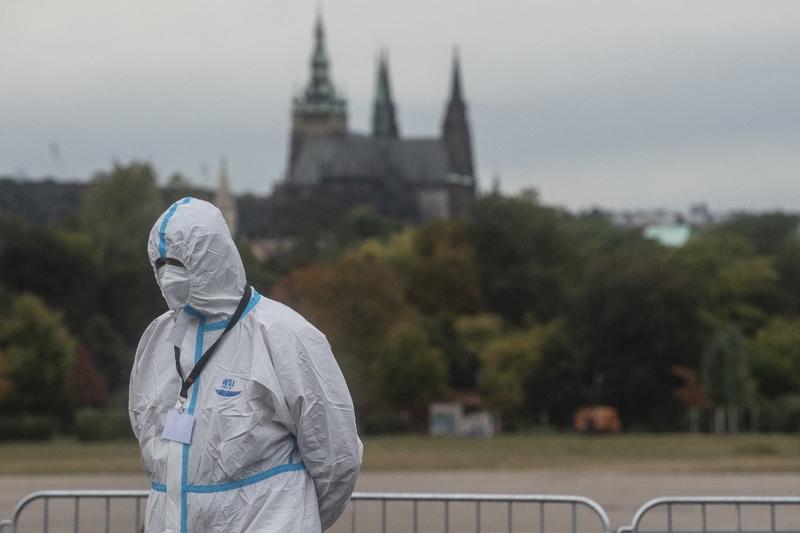 An election committee member wearing a protective equipment as a preventive measure against the coronavirus COVID-19 disease is pictured at a drive-in polling station for quarantined voters, on Oct 06, 2021 in Prague, ahead of the country's general election. (MICHAL CIZEK / AFP)
An election committee member wearing a protective equipment as a preventive measure against the coronavirus COVID-19 disease is pictured at a drive-in polling station for quarantined voters, on Oct 06, 2021 in Prague, ahead of the country's general election. (MICHAL CIZEK / AFP)
Czech Republic
The Czech government will force restaurants to check patrons' COVID-19 status, among other measures it decided on Wednesday, to stem a spike in infections that is the highest since April.
The Czech Republic, like other countries in central and eastern Europe where vaccination rates are below the European Union average, is looking to keep a new wave of coronavirus cases well below peaks seen earlier in 2021.
Two-thirds of adults in the country of 10.7 million are fully vaccinated, below an EU average of 74 percent, and health and government officials have said the vast majority of new cases involve the unvaccinated.
On Tuesday, daily cases reached 3,246, more than double the number a week ago.
The government on Wednesday said it would require restaurants and clubs to check COVID certificates - which showa person's vaccination or testing status - and mandate masks at all indoor events and in workplaces.
It will also end free testing for people over 18 as it aims to encourage more people to get the vaccine, and shorten the validity period of test results, used for facilitating visits to public events and restaurants.
Hospitalizations had risen to 620 as of Tuesday, from 249 at the start of October, with 102 people in intensive care, health ministry data showed.
ALSO READ: Dutch coronavirus cases jump 44% as hospitals feel strain
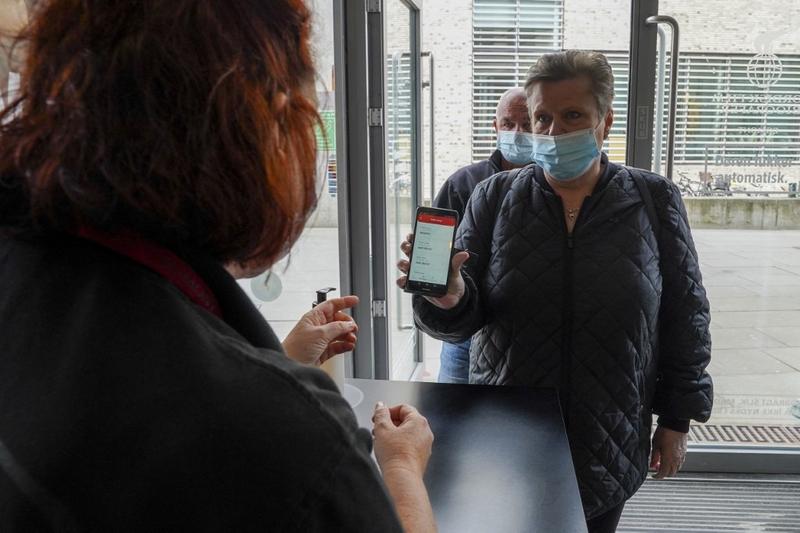 An employee at a Nordisk Film cinema in the center of Copenhagen on May 6, 2021 checks the "Corona pass” of a customer as they come to watch a film on the first day that movie theaters in the Danish capital reopened after being closed due to COVID-19 restrictions. (TOM LITTLE / AFP)
An employee at a Nordisk Film cinema in the center of Copenhagen on May 6, 2021 checks the "Corona pass” of a customer as they come to watch a film on the first day that movie theaters in the Danish capital reopened after being closed due to COVID-19 restrictions. (TOM LITTLE / AFP)
Denmark
Denmark has registered 1,127 new cases of COVID-19 in the last 24 hours, the highest daily rate since Aug 24, according to figures from the Statens Serum Institut (SSI) on Wednesday.
In the wake of the figures, Minister for Health Magnus Heunicke took to Facebook to defend the government's strategy, which has seen the removal of nearly all restrictions against COVID-19 and a reduction in testing from Sept 10.
"We know exactly what to do when we see the beginning of rises in infections this fall," he wrote on Wednesday afternoon. "Vaccines, testing, detection, isolation. But nothing can be done without support and unity in the population."
"We are closely following the movements in the corona pandemic, the latest initiative is the expansion of our wastewater testing, and the Danish epidemic is under control despite the increases here in October."
However, speculation that the infection may actually be more prevalent is being fueled by the SSI's own testing statistics, which reveal Wednesday's 1,127 new cases came after approximately 57,000 tests.
In contrast, the previous highest total, of 1,340 new cases in August, came after approximately 87,500 tests.
 A doctor and a nurse examine patients at the COVID-19 unit of a hospital in Kjustendil on Oct 19, 2021, one of the municipalities in the 'dark Red COVID-19 zone' of Bulgaria, where more than 500 people out of every 100,000 are infected with coronavirus. (NIKOLAY DOYCHINOV / AFP)
A doctor and a nurse examine patients at the COVID-19 unit of a hospital in Kjustendil on Oct 19, 2021, one of the municipalities in the 'dark Red COVID-19 zone' of Bulgaria, where more than 500 people out of every 100,000 are infected with coronavirus. (NIKOLAY DOYCHINOV / AFP)
Eastern Europe and Russia
Russia will shut workplaces for a week, Latvia went back into lockdown for a month and Romanian funeral homes are running out of coffins, as vaccine-sceptic countries across Eastern Europe face record-setting disease and deaths.
Russia, which boasted of developing one of the earliest COVID-19 vaccines, has been unable to persuade large swathes of the population to take it, and is now facing its highest daily death rates of the pandemic.
President Vladimir Putin announced on Wednesday that the period from Oct 30-Nov 7 would be "non-working days", although salaries would still be paid. Individual regions could extend the shutdown for longer in response to local conditions.
ALSO READ: Putin orders new restrictions with COVID-19 deaths at record
Vaccine hesitancy has hit other Eastern European countries. The EU states with the lowest vaccination rates are all part of the region, including Bulgaria, Romania, Croatia, Poland, Latvia and Estonia.
Romania, where one person is dying of COVID-19 every five minutes, had the world's highest death rate per capita this week, with Bulgaria close behind. Only 36 percent of Romanian adults are vaccinated, compared with 74 percent across the EU as a whole.
This week Latvia imposed a month-long lockdown, becoming the first EU country to shut down again since the bloc began reopening this year as vaccines became widely available.
Around a third of Latvia's population are Russian speakers. A study by SKDS found that only 46 percent of them were vaccinated, compared with 62 percent percent of ethnic Latvians.
Bulgaria, where only a quarter of the population has taken a first dose of vaccine, banned access to indoor public spaces this week for anyone who cannot show proof of vaccination, a negative test or recovery from a recent infection.
Schools in areas with high infection rates will have to shift to online teaching.
Poland's health minister said on Wednesday "drastic measures" could be needed to respond to a sudden surge of infections there, although he said no new lockdown was being considered.
France
France's lower house of parliament voted to approve extending the country's COVID-19 health pass measures until at least July 31, 2022, as governments around Europe look to ensure they can curb the virus as the winter season approaches.
The pass proves the holder has been fully vaccinated against COVID-19, or has recently tested negative for COVID-19, thereby allowing the holder to enter places such as bars and restaurants and sports venues where the health pass is compulsory.
Nationwide demonstrations broke out in France in August by those opposed to the COVID-19 health pass, although the numbers of protesters have gradually fallen in recent weeks.
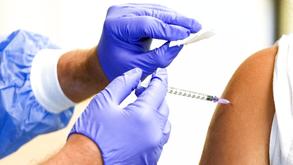 A doctor vaccinates a student with the Moderna COVID-19 vaccine as part of the vaccination campaign called '#HierWirdGeimpft', #Here We Vaccinate, during a visit of German President Frank-Walter Steinmeier (not in frame) at Ruth Cohn School in Berlin, Germany, Sept 13, 2021. (MARKUS SCHREIBER / AP)
A doctor vaccinates a student with the Moderna COVID-19 vaccine as part of the vaccination campaign called '#HierWirdGeimpft', #Here We Vaccinate, during a visit of German President Frank-Walter Steinmeier (not in frame) at Ruth Cohn School in Berlin, Germany, Sept 13, 2021. (MARKUS SCHREIBER / AP)
Germany
Germany's seven-day incidence rate rose for the seventh day in a row and climbed to 80.4 cases per 100,000 inhabitants, the Robert Koch Institute (RKI) announced on Wednesday.
Daily COVID-19 infections in Germany rose significantly as 17,015 new cases were registered within one day, around 5,100 more than a week ago, according to the RKI, the federal agency and research institute responsible for disease control and prevention.
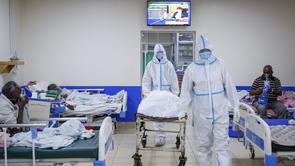 Medical workers remove the body of a coronavirus patient who had died, past others as they lie on their beds, in the intensive care unit of a hospital in Machakos, Kenya on Aug 20, 2021. (BRIAN INGANGA / AP)
Medical workers remove the body of a coronavirus patient who had died, past others as they lie on their beds, in the intensive care unit of a hospital in Machakos, Kenya on Aug 20, 2021. (BRIAN INGANGA / AP)
Kenya
Kenyan President Uhuru Kenyatta on Wednesday ordered lifting of nationwide dusk-to-dawn curfew the government imposed at the onset of COVID-19 pandemic in March 2020 amid drastic slump in new infections and fatalities.
Speaking during an event to mark National Heroes' Day in central Kenyan county of Kirinyaga, Kenyatta said the night curfew had been vacated amid subsiding threat of the pandemic to the economy and livelihoods.
Latvia
At an extraordinary meeting on Wednesday, the government of Latvia adopted a strict lockdown regulation, complete with a night-time curfew, that will be in force between Oct 21 and Nov 15, to curb the rapid spread of COVID-19.
The new restrictions will affect gatherings, public activities, retail trade, services, education and other in-person activities, the government said. The objective is to significantly reduce people-to-people contacts and to break the chain of COVID-19 transmissions.
People will be ordered to stay at home from 8 pm till 5 am. They will be allowed to leave their home for essential purposes only.
During the lockdown, all private and public gatherings, including meetings and demonstrations, will be banned and public transport will be operating at 50 percent passenger capacity.
Lithuania
Over the past 24 hours, Lithuania has registered 3,331 new coronavirus infections and 11 COVID-19-related deaths, Statistics Lithuania said on Wednesday morning.
This is the biggest increase in the number of new daily cases this year, according to Statistics Lithuania.
On Wednesday, the number of hospitalized COVID-19 patients stood at 1,669, including 157 ICU cases.
Mozambique
The Ministry of Health (MISAU) of Mozambique on Wednesday began the third phase of the vaccination campaign against COVID-19.
The ministry hopes to vaccinate around 7 million people throughout the country particularly in rural areas during this phase which could last until March 2022, said the Coordinator of the National Vaccination Campaign Against COVID-19 at the ministry Ivan Manhica at a press briefing in Maputo, the capital of Mozambique.
According to Manhica, vaccines from Astrazeneca, Verocell and Johnson & Johnson will be administered in the country in the period.
Novartis
Novartis has agreed to expand its fill-and-finish support for the Pfizer/BioNTechCOVID-19 vaccine by using manufacturing facilities Ljubljana, Slovenia, to fill at least 24 million doses in 2022, the Swiss drugmaker said on Thursday.
Novartis plans to take bulk mRNA active ingredient from BioNTech and fill this into vials under sterile conditions for shipment back to BioNTech for distribution.
This new agreement follows an earlier deal for the fill and finish of more than 50 million doses in 2021 at the Novartis Stein site in Switzerland.
Poland
Poland is planning to make third doses of the coronavirus vaccine available to all adults "over the next few weeks", Prime Minister Mateusz Morawiecki said on Wednesday.
"Those over 18 who had their last dose at least six months ago will be able to get another dose," Morawiecki said in a Facebook post.
 A woman wearing a face mask walks in Moscow on Oct 5, 2021. (DIMITAR DILKOFF / AFP)
A woman wearing a face mask walks in Moscow on Oct 5, 2021. (DIMITAR DILKOFF / AFP)
Russia
Russia has reported some COVID-19 infections with a new coronavirus variant believed to be even more contagious than the Delta one, the RIA news agency said on Thursday.
It is possible that the AY.4.2 variant will spread widely, RIA quoted the state consumer watchdog's senior researcher Kamil Khafizov as saying.
That could cause the rate of new COVID-19 cases, already at record highs in Russia, to rise even further.
The new variant could even replace Delta eventually, although the process is likely to be slow, he said.
Meanwhile, Moscow will reintroduce lockdown measures from Oct 28 to combat surging COVID-19 cases, Mayor Sergei Sobyanin said on Thursday, with all shops, bars and restaurants due to close, except those selling essential goods, such as supermarkets and pharmacies.
Sweden
Sweden has extended the pause of Moderna's COVID-19 vaccine for people aged 30 and younger due to rare heart-related side effects, the public health agency said on Thursday.
The health agency said earlier in October that data pointed to an increase of myocarditis and pericarditis among youths and young adults vaccinated with Moderna vaccine Spikevax, and paused the use for all born 1991 or later.
The agency said on Thursday the pause would be extended beyond the original deadline of Dec. 1 and those who had taken a first dose of the Moderna vaccine would be offered the Comirnaty vaccine from Pfizer/Biontech instead.
The European Medicines Agency approved the use of Comirnaty in May, while Spikevax was given the nod for children aged over 12 in July.
The health agency also said it was time to cease wide-scale testing and will remove the recommendation for testing for those who are fully vaccinated, even if they are displaying symptoms.
"We must test those who are most at risk of being infected with COVID-19. The vaccine protects well, above all against severe disease but also against infection and the spread of infection," health agency official Britta Bjorkholm told a news conference.
Around 85 percent of all Swedes aged 16 and up have had one dose of vaccine and 80 percent have had two shots or more.
The new testing guidelines come into effect on Nov 1. People who are patients or working in healthcare should still get tested, as should those who have been in contact with someone confirmed to be positive.
Of 139,651 tests last week, 3 percent came back positive.
Sweden, which opted against wide-ranging lockdowns and relied mostly on voluntary recommendations throughout the pandemic, has relatively low levels of cases, hospitalizations and deaths currently compared with other European countries.
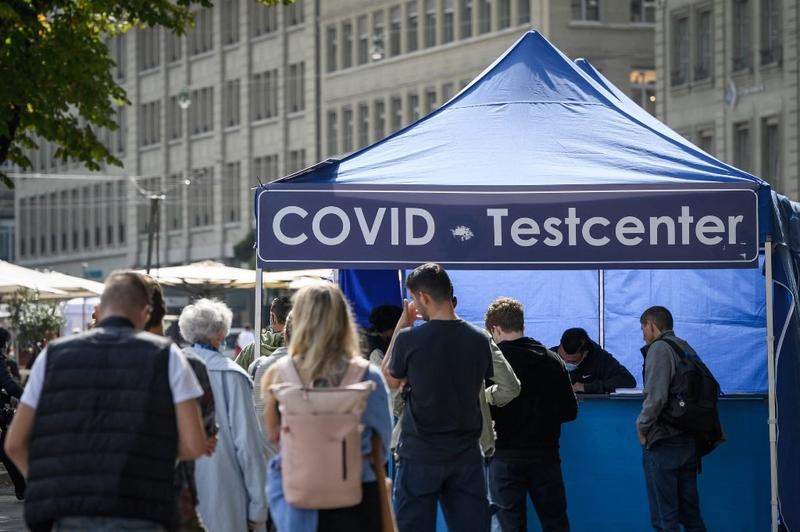 People queue at a COVID-19 test center installed in a street of Swiss capital Bern on Sept 17, 2021. (FABRICE COFFRINI / AFP)
People queue at a COVID-19 test center installed in a street of Swiss capital Bern on Sept 17, 2021. (FABRICE COFFRINI / AFP)
Switzerland
The Swiss government will not ease its remaining pandemic-related restrictions on public life for the time being, it said on Wednesday, citing unacceptably high risks of another wave of infections.
The state now requires people to show COVID-status certificates to enter bars, restaurants and other indoor spaces and events, in a move to relieve pressure on hospitals.
The government discussed the possibility of lifting the certificate requirement in certain cases, but decided against this.
"With schools reopening after the autumn break, the cooler season ahead, stagnating case numbers, the highly contagious Delta variant and a relatively low level of immunization, it concluded that the risks are still too high for easing restrictions at present," it said.
"To prevent hospitals from being overwhelmed by another wave of infections, it intends to maintain the current certificate requirement for the time being and reassess the situation in mid-November."
Switzerland and tiny neighbour Liechtenstein have recorded nearly 860,000 infections and more than 10,800 deaths from COVID-19 since the coronavirus pandemic began. Around 62.5 percent of the population is fully vaccinated.
Ukraine
Ukraine registered a record daily high of new coronavirus infections and related deaths, the health ministry said on Thursday.
Ministry data showed 22,415 new cases over the past 24 hours, exceeding the previous high of 20,341 on April 3.
There were also 546 new deaths, surpassing the Oct 19 record of 538.
The number of new daily coronavirus infections in Ukraine, which has a population of 41 million, has increased over the past several weeks and the government last month tightened coronavirus lockdown curbs.
It also extended a state of emergency that allows authorities to impose curbs until year-end to rein in infections.
Ukraine's pandemic tally of infections stands at 2.7 million, with 62,389 deaths.
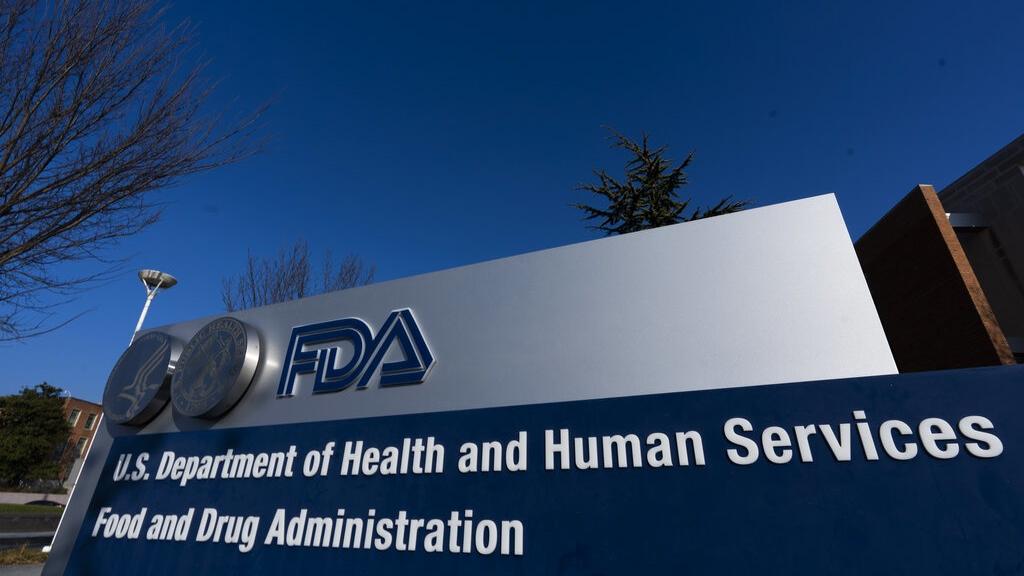 Food and Drug Administration building is shown Thursday, Dec 10, 2020 in Silver Spring, Md. (MANUEL BALCE CENETA / AP)
Food and Drug Administration building is shown Thursday, Dec 10, 2020 in Silver Spring, Md. (MANUEL BALCE CENETA / AP)
United States
The US Food and Drug Administration cleared a path for millions more Americans to receive COVID-19 vaccine booster shots, as the nation looks to bolster its defenses and prevent another virus surge.
The agency said in a statement on Wednesday that Moderna Inc vaccine recipients 65 and over can receive a third shot, as can adults 18 and up who are at high risk of severe COVID-19 or with frequent institutional or occupational exposure to the virus that causes the disease.
Additionally, all J&J recipients 18 and older are eligible for a booster shot at least two months after receiving their first dose.
The agency also allowed each of the available COVID-19 vaccines to be used as a booster dose for eligible individuals following completion of a primary vaccination with a different vaccine.
The moves will mean the US has a bigger toolkit to try to limit a potential winter virus rebound.
FDA officials indicated they would also move quickly to expand eligibility for booster shots as more data become available or if breakthrough cases start to rise in younger adults.
The clearances came after a panel of expert advisers to the FDA unanimously backed the Moderna and J&J booster regimens in two days of meetings last week. Regulators have now signed off on boosters for all three coronavirus vaccines available in the US.
The Moderna booster shot authorized by the FDA is half the dose that is given in the initial two-shot series, and it should be given at least six months after the initial inoculation, regulators said.
The FDA said that a single booster dose of the Pfizer vaccine may be given at least 6 months after completing the primary series to people 18 to 64 with frequent institutional or occupational exposure to the coronavirus.
In permitting mixing and matching, the FDA is allowing J&J vaccine recipients to receive an additional dose of any cleared vaccine after two months.
Likewise, recipients of Moderna and Pfizer who are eligible for a booster would receive their booster, including J&J’s shot, at least six months after their initial immunization regimen.
The decision to allow mixing will create greater flexibility and is beneficial to global public health, Paul Stoffels, J&J’s chief scientific officer, said in a statement.
 A woman receives a Pfizer COVID-19 vaccine as her son (left) looks on, at QueensCare Health Center in a predominately Latino neighborhood in Los Angeles, California, Aug 11, 2021. (ROBYN BECK / AFP)
A woman receives a Pfizer COVID-19 vaccine as her son (left) looks on, at QueensCare Health Center in a predominately Latino neighborhood in Los Angeles, California, Aug 11, 2021. (ROBYN BECK / AFP)
In another development, the White House on Wednesday unveiled its plan to roll out COVID-19 vaccines for children ages 5 to 11, pending the vaccine's approval by the US Food and Drug Administration (FDA).
"In anticipation of the FDA's independent advisory committee meeting on October 26 and the CDC's (the US Centers for Disease Control and Prevention) independent advisory committee meeting on November 2 to 3, today the Biden Administration is announcing a plan to ensure that, if a vaccine is authorized for children ages 5 to 11, it is quickly distributed and made conveniently and equitably available to families across the country," the White House announced in a statement.
The start of a vaccination program for children ages 5 to 11 will depend on the independent FDA and CDC process and timeline, said the White House, adding the country will be ready to begin getting shots in arms in the days following a final CDC recommendation.
The Biden administration has procured enough vaccine to support vaccination for the country's 28 million children ages 5 to 11 years old, according to the White House.
WHO
The World Health Organization (WHO) called on Thursday on the world's 20 richest nations, holding a summit next week, to step up donations of COVID-19 doses to the global south where vaccinations lag.
"The @g20org countries must fulfil their dose-sharing commitments immediately," WHO director-general Tedros Adhanom Ghebreyesus told a news briefing.
Gordon Brown, WHO ambassador for global health financing, said that if the world's richest countries cannot mobilize for a vaccine airlift to developing countries, an epidemiological and economic "dereliction of duty will shame us all".
There is still a shortfall of 500 million vaccines to reach WHO's 40 percent vaccination target in all countries in mid-2022, while 240 million doses are lying unused in the West, Brown said.
Meanwhile, the WHO is still assessing the Russia-designed Sputnik V COVID-19 vaccine for emergency use, according to an update on the WHO's website on Wednesday.
"As with other candidate vaccines, WHO continues to assess Sputnik V vaccines from different manufacturing sites and will publish decisions on their EUL (Emergency Use Listing) status when all the data are available and the review is concluded," WHO said in emailed comments to Reuters.
It said it has restarted the assessment process for the Russian vaccine and that it is awaiting the "completion of rolling submission."
The Russian Direct Investment Fund (RDIF), which promotes Sputnik V abroad, said a group of WHO inspectors is due to visit Russia shortly "to round up all necessary inspections and paperwork on Sputnik V."
Separately, Kirill Dmitriev, the RDIF head, told CNN he expected the WHO to approve Sputnik V in coming months, RIA news agency reported.
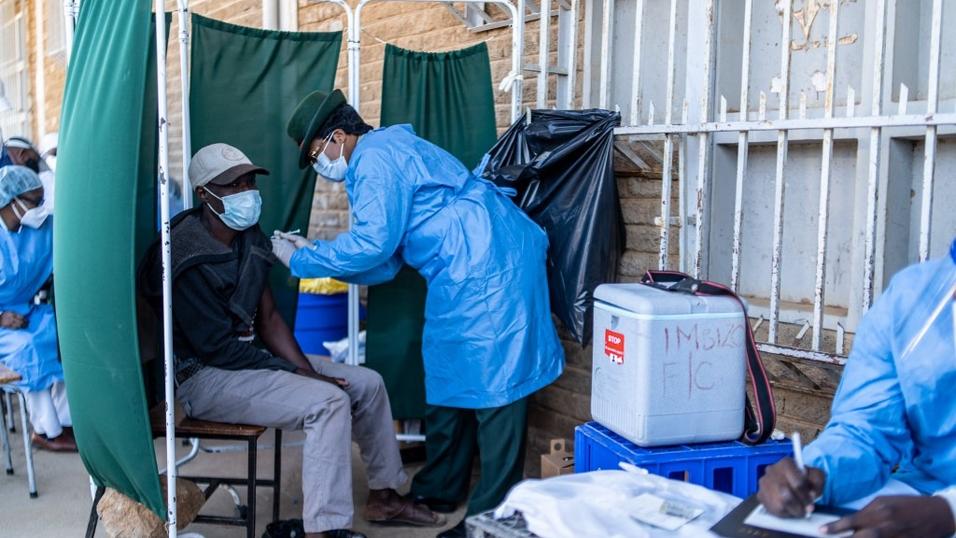 A military personnel inoculate a dose of SinoVac vaccine to a citizen at a mobile clinic in Emganwini township, Bulawayo, Zimbabwe on 3 Aug 2021. (ZINYANGE AUNTONY / AFP)
A military personnel inoculate a dose of SinoVac vaccine to a citizen at a mobile clinic in Emganwini township, Bulawayo, Zimbabwe on 3 Aug 2021. (ZINYANGE AUNTONY / AFP)
Zimbabwe
In its response to the COVID-19 pandemic, Zimbabwe is facing the challenge of a slowing vaccination rate which could derail achievements made to date in curbing the pandemic, Zimbabwean Vice President and Health Minister Constantino Chiwenga warned Wednesday.
The government announced a new COVID-19 response structure headed by Chiwenga, as part of efforts to fortify the national response mechanism.
In a statement announcing the new structure Wednesday, Chiwenga called for heightened efforts from all Zimbabweans and sectors of the economy in fighting the pandemic.


